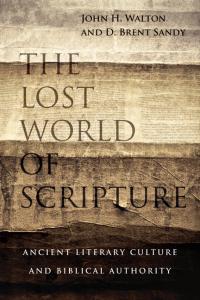 There is a song that I grew up with – along with many others of my generation, as well those before and after.
There is a song that I grew up with – along with many others of my generation, as well those before and after.
The B-I-B-L-E,
Yes, that’s the book for me,
I stand alone on the Word of God,
The B-I-B-L-E.
The implication is that the Bible, the collection of books comprising the Old and New Testaments, is the very Word of God. Certainly the Bible as the Word of God is the focus of much of conservative Protestant Christianity. This, we are told, is the foundation on which we stand – inspired by God, inerrant in the original manuscripts. Verbal plenary inspiration (or better for some, verbal dictation) guarantees the authority of the Word and the authenticity of our faith.
The Bible is the very important. It is through the study of the Bible that we learn about God and his interaction with his people. It has been preserved for us through the Spirit and the Church. We don’t read it or hear it to separate truth from error but to find God. But the Bible isn’t the word of God.
This is a statement that needs more discussion.
 John Walton and D. Brent Sandy in The Lost World of Scripture: Ancient Literary Culture and Biblical Authority emphasize that the ancient Near East was an oral rather than a literary culture. The same was true of first century Galilee and Judea. While literature and literacy were more common than in the ancient Near East, the culture was still based primarily in oral communication rather than books and documents. Oral communication carried real authority – authority that was in no way deficient to the authority of the written word. Propositions 8 to 10 dig into this more deeply: 8) Jesus world was predominantly non-literate and oral, 9) Logos/word referred to oral communication not written texts, and 10) Jesus proclaimed truth in oral forms and commissioned his followers to do the same.
John Walton and D. Brent Sandy in The Lost World of Scripture: Ancient Literary Culture and Biblical Authority emphasize that the ancient Near East was an oral rather than a literary culture. The same was true of first century Galilee and Judea. While literature and literacy were more common than in the ancient Near East, the culture was still based primarily in oral communication rather than books and documents. Oral communication carried real authority – authority that was in no way deficient to the authority of the written word. Propositions 8 to 10 dig into this more deeply: 8) Jesus world was predominantly non-literate and oral, 9) Logos/word referred to oral communication not written texts, and 10) Jesus proclaimed truth in oral forms and commissioned his followers to do the same.
When we limit “the word of God” to the written text of the Bible we diminish the meaning of this phrase. John and Brent emphasize that logos or word in the New Testament refers to oral communication – and the meaning of this communication – the divine truth of this communication. When Jesus says his word will not fail or perish and that he has given the disciples “your word” (Jn 17:14) he is referring to spoken word and the divine truth of these words. The word of God is communication of divine truth. Logos does move beyond oral proclamation of course. In John 1 we read “In the beginning was the Word, and the Word was with God, and the Word was God. He was with God in the beginning.” (v. 1-2)
While Scripture as inspiration gives access to the mind of God – even though it was communicated through human instruments – Jesus as revelation provides unprecedented access to God’s thoughts, not in the form of oral text or written text, but living text. Jesus was the performance, the manifestation, the embodiment of divine reason and wisdom. God spoke his words into a living text, his Son. (p. 126)
Spoken word, living word … the communication of God’s truth to his people. The Bible serves to communicate God’s word to us yet today. But God’s word is not a book. The Bible illuminates God for us, but it is not our foundation or rock.
An Oral Culture. The realization that the culture into which Jesus was born, in which he lived and died, was a predominantly oral culture has implications for how we read and interpret the Gospel accounts of this life. General literacy would have been utilitarian rather than broad. John and Brent point out that “publicly funded education for children was nonexistent in the ancient world.” The ability to read and the ability to write are separate skills with reading more common than writing. The ability to compose a literary work is yet a third skill. It isn’t really surprising that Jesus could read. There is no reason to doubt Luke who records about Jesus …
He went to Nazareth, where he had been brought up, and on the Sabbath day he went into the synagogue, as was his custom. He stood up to read, and the scroll of the prophet Isaiah was handed to him. Unrolling it, he found the place where it is written:
“The Spirit of the Lord is on me,
because he has anointed me
to proclaim good news to the poor.
He has sent me to proclaim freedom for the prisoners
and recovery of sight for the blind,
to set the oppressed free,
to proclaim the year of the Lord’s favor.”
Then he rolled up the scroll, gave it back to the attendant and sat down. The eyes of everyone in the synagogue were fastened on him. He began by saying to them, “Today this scripture is fulfilled in your hearing.”
But writing was not terribly important. We have no record that Jesus ever wrote anything and no claim that anything was written as he spoke. There was no “court reporter” present to transcribe the proceedings. Jesus taught orally and his teaching was shaped to communicate in that format. His audience listened, they did not take notes. His teaching carried authority, he expected it to have lasting permanence, to be remembered and passed along. He probably repeated himself, saying the same or similar things on many different occasions. These oral teachings and eyewitness accounts of his life provide the basis for the Gospel accounts.
The Gospel accounts serve to faithfully communicate God’s divine truth. But we read them faithfully when we understand the oral culture they relate, within which they were preserved and later written down.
More on this in the next propositions and the next post.
If you wish to contact me directly you may do so at rjs4mail [at] att.net.
If interested you can subscribe to a full text feed of my posts at Musings on Science and Theology.











